News & Event


News & Event
News & Event
[The 100th KISTEP Wednesday Forum] The Direction of Science and Technology Policy for Innovation Growth
- Writer Kyungran Choi
- Date2019-03-13
- Hit1,062
File
-
Download
 20190313162421.jpg
(37.54KB / Download 210회)
20190313162421.jpg
(37.54KB / Download 210회)
KISTEP held the 100th Wednesday Forum with the theme of “Direction of Science and Technology (S&T) Policy for Innovation Growth” on March 13th (Wed), 2019. The forum was held to see the current status and changes in the policy implementation of S&T Innovation Office, which is the control tower of national S&T, and discuss the direction of 2019 S&T policies for innovation growth.
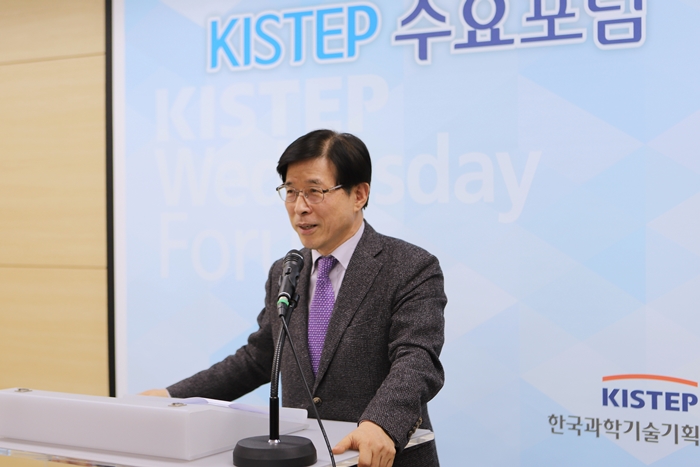
[▲ Sang-seon Kim, (President, KISTEP)]
The forum began with an opening address by President Sang-seon Kim (KISTEP), followed by presentation by Dae-sik Lim (Vice Minister of Science, Technology and Innovation Office, Ministry of Science and ICT (MSIT)). Panel discussion were led by Sung Soo Kim (President, Korea Research Institute of Chemical Technology (KRICT)), Kil-Choo Moon (President, University of Science and Technology (UST)), Seok-jung Song (Advisor, Kolon Industries, Inc.), Woo il Lee (Professor, Department of Mechanical Engineering, Seoul National University(SNU)), and open floor discussion followed the last.
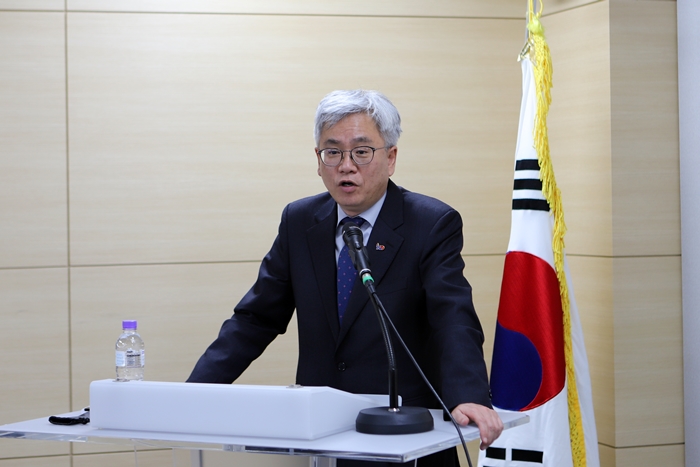
[▲ Dae-sik Lim (Vice Minister of Science, Technology and Innovation Office, MSIT)]
In the presentation, Vice Minister Lim explained the main S&T agenda according to the governance direction of Moon Jae-in administration, and shared ‘National R&D Innovation Plan,’ was prepared for major reforms in the national R&D system from catch-up generation to first-mover and human-centered system. The current government's R&D innovation plan is based on the human-centered innovation that places the center of R&D innovation on the people and researchers. It has prepared detailed action plans, including proposals of 36 detailed implementation projects, and are rapidly ongoing.
He confirmed rapid implementation of innovation strategies by ministries and sectors through the Ministerial Meeting of the related Committee for S&T, which was brought back after 11 years. In addition, he emphasized the importance of future-oriented R&D investment with the beginning of 20 trillion KRW investment national R&D and explained the current status of national S&T innovation policy.
He pointed out that the main policy implementation achievements of the last year were the establishment of the policy framework and implementation system for R&D innovation, including suggesting strategies for S&T, strengthening strategic R&D investment, R&D systems innovation and economic and social contributions. In addition, he asserted the need to push the rapid and strong innovation of governmental departments and the actual implementation of R&D performance to the fields, in order to respond to requests and demands for S&T innovation.
In the following presentation, he said, “We will make efforts for completion not initiation of S&T policy by focusing on field-oriented operation in 2019.” He explained 3 main directions of policy, first, leading innovation in the era of R&D 20 trillion-won ([Task 1] Full-scale operation of the national S&T innovation system, [Task 2] Innovation of R&D investment system), and secondly, strengthening researcher-centered challenge and innovation ([Task 3) Creating an autonomous and creative research environment, [Task 4] Enhancing challenging and innovative R&D, [Task 5] Spreading R&D which solves the problems of people's lives), on the third, strengthening innovation capacities by subjects ([Task 6] Training creative and challenging human resources, [Task 7] capacity building of public R&D, [Task 8] Development of regional innovation ecosystem, [Task 9] Considering global innovative capacities, [Task 10] Building healthy research culture).
Lastly, he said, "We will accelerate R&D innovation through the Ministerial Meeting of the related Committee for S&T, and help people to lead innovative growth by discovering and promoting innovation agendas in the governmental departments. And we will continue to push forward with R&D innovation that can be felt by the people with ‘faith, hope and trust.’
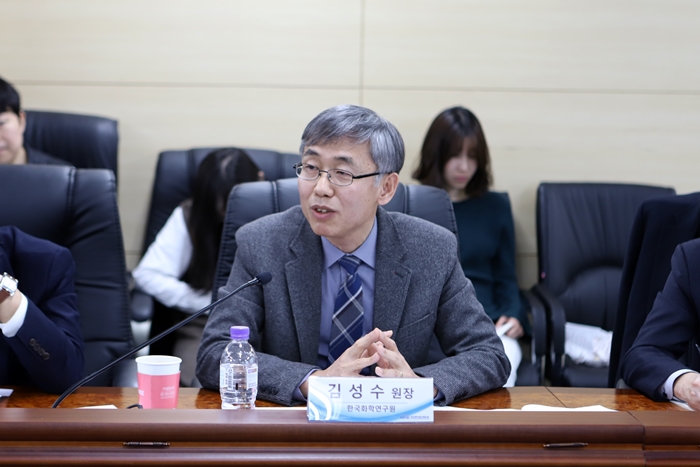
[▲ Sung Soo Kim (President, KRICT)]
In the panel discussion, Sung Soo Kim (President, KRICT) said, ‘At the end of Kim Dae-jung administration, S&T roadmap was arranged, the 1st S&T Basic Plan was established on this basis in the Roh Moo-hyun administration and total roadmap was organized for the direction of R&D investment. Since then, until the present 20 trillion R&D era, there were some parts that were disconnected. I believe the current administration should make this strong. There needs to be a way to solve the problems since we have no big picture in the form of the 4th S&T strategic roadmap," emphasizing, "In order to have power what the Innovation Office announced, we need the authority to decide the feasibility study and the spending limits on budget of each ministry on the other, and if the role of each ministry is rearranged through this, we can have executive ability for future innovation strategy and a mid- and long-term investment strategy.”
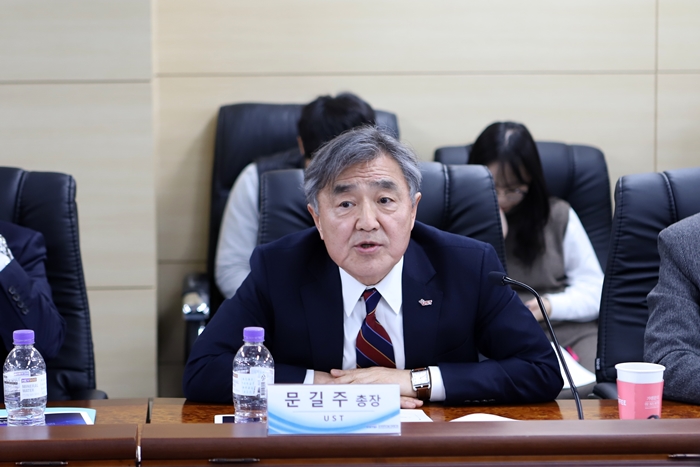
[▲ Kil-Choo Moon (President, UST)]
"In order for innovation growth through S&T, not only the government, but also the national research institutes, government funded research institutes and local governments have to be changed," said Kil-Choo Moon (President, UST). He also mentioned “The important national programs such as Venture, AI, fine dust and hydrogen economy changes whenever there is the High-Risk High-Return change in political power, and it defects the continuity of research. That is, a research climate can't be created. Giving autonomy is important for investment efficiency of 20 trillion won by the government.”
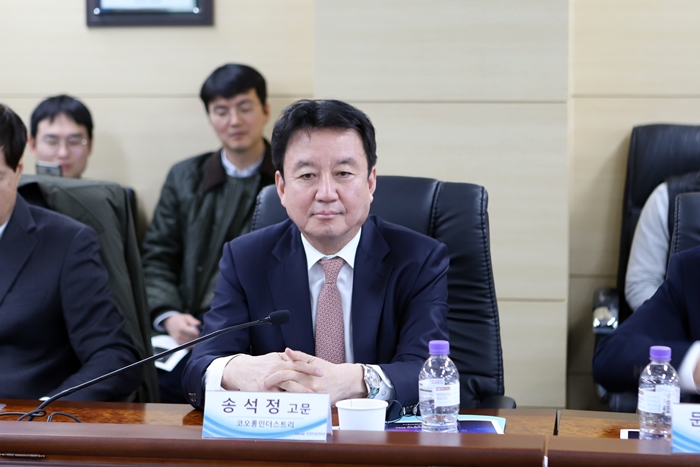
[▲ Seok-jung Song (Advisor, Kolon Industries, Inc.)]
Seok-jung Song (Advisor, Kolon Industries, Inc.) emphasized, “It is important to focus on operation to generate results for successful implementation of the established national R&D innovation policy, and policy consistency is also necessary because it takes time to accumulate.” Lastly he said, “It is important to communicate and cooperate with industries that account for more than 70 percent of the national R&D in establishing policy directions for innovation growth.”
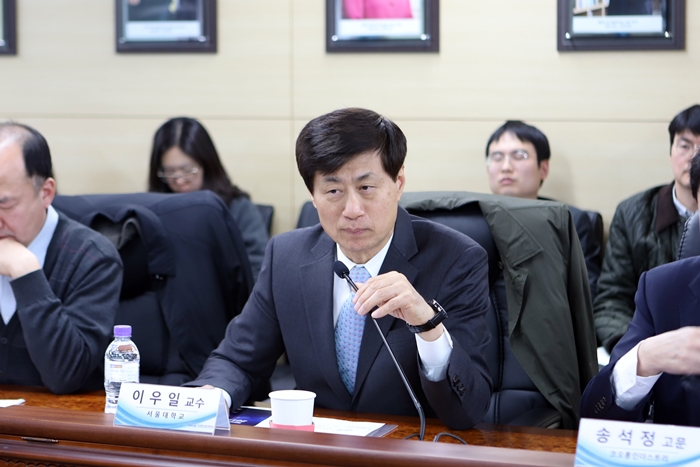
[▲ Woo il Lee (Professor, Department of Mechanical Engineering, SNU)]
Woo il Lee (Professor, Department of Mechanical Engineering, SNU), stressed the importance of spending budget on building infrastructure, telling that most of the budget so far is allocated to knowledge production and not on infrastructure and system management. He also mentioned, "It is not appropriate to point out specific industries as innovation growth engines. For developed countries, industries develop derivatives when the investment goes to public technology, so there is a need to invest in public S&T."